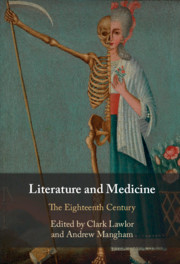Book contents
- Literature and Medicine
- Literature and Medicine
- Copyright page
- Contents
- Figures
- Contributors
- Acknowledgements
- Introduction
- Part I Literary Modes
- Chapter 1 ‘Mere Flesh and Blood’
- Chapter 2 Jane Barker, Medical Discourse, and the Origins of the Novel
- Chapter 3 Imaginary Invalids
- Part II Psyche and Soma
- Part III Professional Identity and Culture
- Index
Chapter 3 - Imaginary Invalids
The Symptom and the Stage from the Restoration to the Romantics
from Part I - Literary Modes
Published online by Cambridge University Press: 03 June 2021
- Literature and Medicine
- Literature and Medicine
- Copyright page
- Contents
- Figures
- Contributors
- Acknowledgements
- Introduction
- Part I Literary Modes
- Chapter 1 ‘Mere Flesh and Blood’
- Chapter 2 Jane Barker, Medical Discourse, and the Origins of the Novel
- Chapter 3 Imaginary Invalids
- Part II Psyche and Soma
- Part III Professional Identity and Culture
- Index
Summary
From the revival of the English theatres under the Restoration to the rise of a transnational Romantic theatre in the early nineteenth century, developments in dramatic literature and acting mirrored shifting medical constructions of the body, disease, and health. At the same time, they reflected a deep cultural anxiety about the feigning of illness. This chapter will consider how notions of both true and false ill-health were explored in English drama of the long eighteenth century through the medium of the performed symptom. Symptoms could disclose dramatic internal truths, or could be faked by both patients and actors – and misread by doctors and spectators – to comic effect. For most of the eighteenth century, the latter model prevailed as playwrights and actors drew upon theatre’s association with fakery to mock affected invalidism, incompetent physicians, and the frauds of fashionable society. As nerve-based conceptions of sensibility and vitalist paradigms rose to prominence, however, a new generation of playwrights and performers called upon disease’s symptoms not to spoof quackery but to represent emotional interiority. The resulting performance languages would help to give birth to the Romantic stage.
- Type
- Chapter
- Information
- Literature and MedicineThe Eighteenth Century, pp. 70 - 88Publisher: Cambridge University PressPrint publication year: 2021



